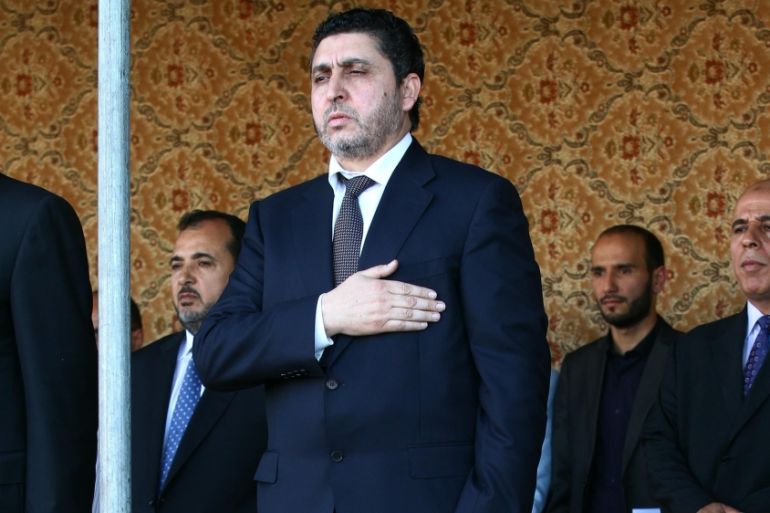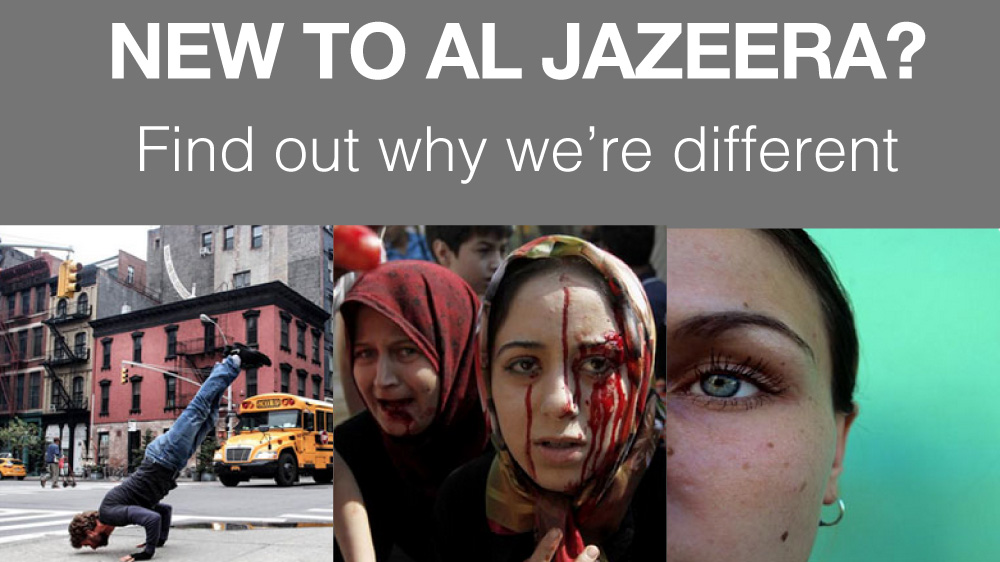Q&A: The two sides of Libya – Khalifa al-Ghwell
The leader of Libya’s self-declared government based in Tripoli says the country’s latest peace framework is baseless.

Al Jazeera interviewed the prime ministers of Libya’s two parallel governments. Read the Abdullah al-Thinni interview here.
A former engineer from the city of Misrata, Khalifa al-Ghwell heads one of Libya’s two parallel – and rival – governments. He and his supporters are based in Tripoli, the largest metropolis of the country, but have extended their influence to control Libya’s west and many of its economic resources.
Keep reading
list of 4 itemsAustin confirms Russians deployed to airbase housing US military in Niger
What’s next as ‘heavy-handed’ US negotiates pullout from Niger?
Putin says ‘radical Islamists’ behind Moscow concert hall attack
The schism in Libya’s current governing system can be traced back to the ousting of former leader Muammar Gaddafi, who retained his grasp on Libya for four decades until the 2011 uprising. The General National Congress (GNC) subsequently took power during the transition in Libya.
But optimism soon soured as the path to new governance became warped by conflict, and dialogue degenerated into sparring between two armed factions – Operation Dignity, which railed against “Islamic extremists”, and Libya Dawn, a patchwork of conservative Misratan businessmen, Muslim Brotherhood supporters and armed groups such as Ansar al-Sharia.
Libya Dawn now backs Ghwell’s Tripoli-based government, which says it is a revival of the post-revolutionary GNC. Though it is not recognised by the international community, Ghwell’s government claims its legitimacy through a recent Supreme Court ruling that declared the June elections unconstitutional. In July, several of Libya’s parties agreed to a UN-sponsored framework for peace, but Ghwell’s government called the process illegitimate and did not sign on to the deal. A new round of peace talks began in Geneva on Tuesday.
Ghwell spoke to Al Jazeera about the future of Libya’s dialogue process.
RELATED: Libya: A tale of two governments
Al Jazeera: Why should your government be recognised internationally?
Khalifa al-Ghwell: My government controls 80 percent of the country. Beyond that, it controls the important areas of Libya: the area of the Mellitah oil and gas complex, where European countries like Italy have strong economic interests, as well as coasts that see trade to Lampedusa.
The international community cannot attempt to renew economic relations and to combat terrorism without first engaging in dialogue with us. Why would Europe speak with other authorities if the issues that are of true concern are taking place here, in our territory? … Europe only continues to blame us for illegal immigration, but it has neglected to provide us with the means and equipment to improve security management.
|
The international community cannot attempt to renew economic relations and to combat terrorism without first engaging in dialogue with us. |
Al Jazeera: How is your government responding to the security concerns presented by groups such as the Islamic State of Iraq and the Levant (ISIL)?
Ghwell: We know there are terrorists among us, and for this reason we are trying to establish a new army and a police force… But why is Europe supporting Tunisia in the construction of a wall on its southern border, in order to combat fundamentalist cells, when it neglects to support us in our efforts to defend our borders with Chad, Niger, Mali and Sudan?
Those dying in the fight against ISIL are our men, our soldiers. They are the ones dying in attacks on checkpoints.
Al Jazeera: How do you respond to claims that your government facilitates terrorism?
Ghwell: I reject the charge that mine is an Islamist government. Fundamentalism and terrorism should be fought, as they betray the principles of Islam. Last week, we created a new police force of 4,000 and founded another 13 military brigades… We defend civilians, and we want a united Libya.
Al Jazeera: Why did your government refuse to sign the peace agreement chaired by Bernardino Leon, which called for the formation of a national unity government?
Ghwell: The document does not represent us. It calls for a prime minister and two vice premiers, but the only party recognised is the Tobruk one, and this is unacceptable to us… The Tobruk authorities are betraying the principles of the revolution.
We did not fight against the Gaddafi regime only to end up with his former men in power. These traitors will be judged by history. The Leon agreement would take Libya back four years, and we cannot accept this.

Our government comes from the GNC, which we restored, and was legitimised by a Supreme Court judgement. There should be no other authority.
Al Jazeera: What are your government’s plans for the future?
Ghwell: We want a united Libya, but one united by a productive dialogue, not a fake one that disrespects the principles of the revolution. In our view, the text of the Leon agreement humiliates the Libyan people. We insist on making Libya a state that thrives and looks to the future, but the only legitimate government is ours.